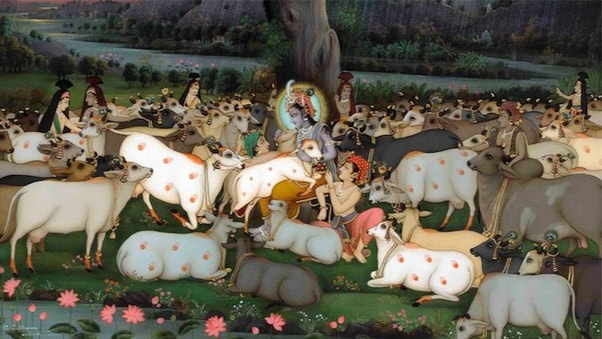|
Raja Janaka is popularly known as the father of adopted daughter Ma Sita who married with Shree Rama son of Raja Dasratha of Ajodhya. Raja Janaka is called Videha i.e. due to non-attachment to material possessions. He was king of Mithila (or Videha) kingdom in 8th or 7th century BC. Its capital is believed to be either Janakpur (in present-day Nepal), or Baliraajgadh (in present-day Madhubani district, Bihar, India). He was intensely interested in spiritual discourse and in his court had rishis such as Yajnavalkya. Yajnavalkya is credited for coining Advaita (non-dual, monism). He wrote texts such as the Yajnavalkya Smriti, Yoga Yajnavalkya and some texts of the Vedanta school.
The Episode of 1000 cows Once, Raja Janaja announced a debate among Vedic scholars on the topic “Truth” and kept an award of thousand cows whose horns were tied with ten gold coins. Yajnavalkya asked one of his pupils to drive these cows to the house. Asvala was the hotri priest of Raja Janaka. He questioned him, whether he treat himself best knower of the truth. Yajnavalkya said, “I prostrate myself before the greatest knower of Truth, but I am desirous of the cows. I have taken the cows because I wanted the cows. Asvala commenced the debate on “concept of Truth”. Thereafter, a number of sages raised questions to Yajnavalkya. These sages were Arthabhaga, Bhujyuh Lahyayani, Usasta, Kahola Kaushitakeya, Uddalaka Aruni, Gargi Vacaknu and Vidagdha Sakalya. During the course of debate, Yajnavalya explained the various aspects of “Non-dual self and Material creation, sense organs, forms of gods, death, yajna, Self-Realization, Self-Surrender etc. and won the debate. Source: The Brihadaranyaka Upanishad The spiritual Concepts enlightened by Rishi Yajnavalya:
5. Absolute consciousness or Brahman - One who inhabits within the earth, air, water, fire, sky, heaven, sun, moon, stars, dimensions of universe, ether, darkness, light, all beings, sense organs, mind, intellect etc. but these does not know who controls from within, that is the Internal Ruler, your own immortal self. These are name and form only. The Internal Ruler or Self alone is the only True Knower; The Absolute Self is the Eternal Witness. The Self has no form but all forms are the Self. It is above heaven and below the earth, It is this heaven and earth as well as between them, and It is pervaded by the “un-manifested ether” (unformed) eternal "ether" (Absolute eternal knowledge). 6. Attributes of Brahman - Yajnavalkya describes the formless Absolute Brahman in terms of Neti-Neti i.e. "not this, not this". It is neither gross nor minute, neither short nor long, neither red color nor oiliness, neither shadow nor darkness, neither air nor ether, unattached, neither savour nor odour, without eyes or ears, without the vocal organ or mind, non-luminous, without the vital force or mouth, not a measure, and without interior or exterior. It does not eat anything, nor is It eaten by anybody. Under the mighty rule of this Immutable, the sun and moon are held in their positions; under the mighty rule of this Immutable, heaven and earth maintain their positions; under the mighty rule of this immutable, moments, Muhurtas, days and nights, fortnights, months, seasons and years are held in their respective places; under the mighty rule of this Immutable, some rivers flow eastward, others flowing westward continue in that direction, and still others keep to their respective courses. 7. Ignorant - One who is ignorant of the Non-Dual Divine may perform all proper duties to his gods, such as accepting the austerities of his cast or duties, making offerings and so forth but "such acts" are "perishable".
10. Self-Surrender - Surrendering one-self without further desire means remaining at rest with Absolute Consciousness. Surrendering to the Absolute is the true way one "conquers further death".
1 Comment
|
Archives
May 2024
Categories |

 RSS Feed
RSS Feed